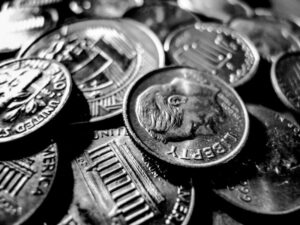Excess, debt and a culture feasting on the environment
Tis’ the season of giving. Tis the season to be jolly. Tis the season of goodwill. Tis when families come together around a warm cosy fire. To feast and be merry. Tis to hear the happy cries of children as they unwrap presents from the ultimate altruist, Santa Claus. These images of the quintessential Christmas are seared in our minds, but like so many elements of modern society, when you strip away the wrapping, it reveals a dark side that is anything but jolly.
Christmas is a religious festival celebrating the birth of Jesus Christ. You’d be hard-pressed to make that connection any longer though because in secular society, it has become a celebration of consumption. A fitting ode to the fact consuming is the religion of modern society.
And boy do we spend big when it comes to gifts. In America, spending on gifts hit $963 billion in 2022. That works out at just under $1000 per person. To put that into perspective, in the UK, spending on gifts is expected to hit an all-time high of £27 billion ($34 billion) this year, which works out at £420 ($534) per person.
Here we get to the first layer of the dark side of Christmas. That quintessential image creates strong social expectations to keep up with the pack. And it encourages, nay, celebrates, irresponsible spending to do so.
The problem is that most people are broke. In America, 40 per cent of respondents to a 2019 Gallup poll said they are either running into debt or barely making ends meet. An estimated 12 million Americans use high-interest payday loans. 70 per cent of people who get these loans use them to pay basic expenses like rent and utilities.
If people can’t afford to pay for bills how are they paying for Christmas? Using credit cards, of course. The ultimate cheat code for keeping up with appearances. Credit cards feed into the concept of ‘living your best life’. It’s all about buying now and worrying about the consequences later. And Christmas doesn’t compare when it comes to ‘worry about the consequences later’.
What this all leads to is a culture where it’s perfectly normal to spend (and live) far beyond your means. That explains why, according to the Federal Reserve, credit card debt exceeded $1 trillion in 2023. Christmas spending quite literally depends on debt. WalletHub’s November holiday shopping survey shows 25% of Americans still have holiday debts from last year.
People are up fighting to keep their heads above water. At Christmas though, that all seems to be forgotten. It’s the season of excess, of unadulterated decadence, of pushing it to the limits. Better to spend now, and worry about the consequences later.
The need to live up to expectations, to have a bundle of gifts, to present a feast of wonders on the table, is not only expensive. When we unlock the next layer of the dark side we see stress, anxiety and arguments. It’s a time when weaknesses in a relationship create bulging sores that hit bursting point. It brings couples to the brink, and many don’t last. Which explains why divorce rates go up in January.
So Christmas is financed through debt and often leaves couples on the brink of divorce. Socially then, it’s not so merry. And that’s before we get to our next layer — the environmental impacts of all of those gifts. During the holiday period, Americans produce 25% more waste, which amounts to over 1 million tonnes of the stuff. That waste contributes to higher emissions and is generally indicative of a culture that exists way beyond limits.
But that’s really what Christmas has become. A celebration of a culture that lionises extremes, where decadence and excess are encouraged. Where the spending frenzy continues unabated through a celebration of debt.
Christmas like nothing else shows how detached we are from the consequences of our actions. Where common sense goes out of the window. All to live up to social expectations that make us behave without logic. And as soon as it ends, it begins again. Many families will begin saving to afford Christmas in January. As a society, we continue to spiral out of control, consumed by a frenzied celebration of consumption that compels society to eat itself alive.



